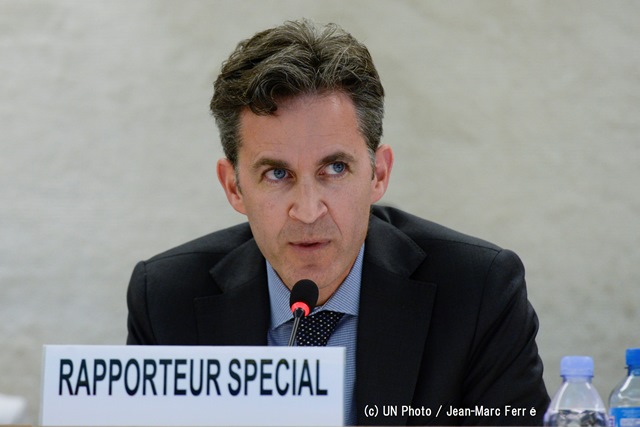Japan: UN independent expert shows concerns on the limited space for public protest and dissent in Okinawa
May 30, 2017
 UN Special Rapporteur on the right to freedom of opinion and expression, Mr. David Kaye, expressed concerns on undue restrictions on public protest and dissent in Okinawa, in his report released today. The report is an outcome of his first official visit to Japan in April last year.
UN Special Rapporteur on the right to freedom of opinion and expression, Mr. David Kaye, expressed concerns on undue restrictions on public protest and dissent in Okinawa, in his report released today. The report is an outcome of his first official visit to Japan in April last year.
In his comprehensive report on wide-ranging issues of freedom of expression in Japan such as: media independence; interference in the communication/ expression of history; access to information; discrimination and hate speech; and restrictions on election campaigns, the Special Rapporteur dedicated whole two paragraphs to address the situation in Okinawa as below.
- “The Special Rapporteur also shared his concerns about public protest, in particular in Okinawa, with the Coast Guard. He communicated to the authorities in 2015 his concern regarding allegations of disproportionate restrictions on protest activity taking place in Okinawa.[1] The Special Rapporteur has received credible reports of excessive use of force and multiple arrests. He was especially concerned by reports on the use of force against journalists filming the protests. As much as the protection of national security provides for the implementation of restrictions in certain areas, careful review processes must be in place to avoid undue restrictions. Particular attention must be paid to all the reported events of confrontation with journalists, considering the vital importance of ensuring full access to information to the public on the ongoing confrontations. The Special Rapporteur has received significant reports of continuing restrictions on expression and protest in Okinawa, which raise legitimate concerns about the availability of space for dissent and access to information for those throughout Japan about the situation there.”
- “In one recent case, relevant to the Special Rapporteur’s concerns expressed during the visit, in October of 2016, Hiroji Yamashiro, the head of the Okinawa Peace Action Center, was arrested on suspicion of cutting barbed wire near a U.S. military helipad construction site in Higashi, northern Okinawa.[2] He was also charged with obstructing relocation work at Camp Schwab in the Henoko area of Nago and injuring a Defense Ministry official by grabbing the official’s shoulders and shaking him. Mr. Yamashiro pleaded not guilty to the charges of forcible obstruction of business and assault, but admitted to the charge of property destruction for cutting the barbed wire. Mr. Yamashiro had been detained for five months without trial. Such a lengthy detention seems disproportionate to Mr. Yamashiro’s alleged actions. At the time of this writing, Mr. Yamashiro has been released from custody, but the Special Rapporteur is concerned that this government action could chill expression and particularly public protest and dissent.”
Based on the concerns above, the Special Rapporteur issued a following recommendation to the Japanese government.
“Based on his visit and information subsequently received in connection with the visit, the Special Rapporteur is particularly concerned about the pressures placed on public protest in Okinawa. While he understands the pressures placed upon them, public authorities, especially law enforcement, should make every effort to enable such protest and dissent, including the coverage of such activities by the media. Public demonization of protesters, including by disproportionate penalties imposed on them, undermine the fundamental freedom all Japanese enjoy to express their opposition to public policies.”
The Special Rapporteur will present the report on 12th June at the 35th session of the UN Human Rights Council. Read the report (advanced unedited version) here ![]()
———
[1] A/HRC/31/79 JPN 1/2015, available at: https://spdb.ohchr.org/hrdb/31st/public_-_AL_Japan_15.06.15_(1.2015).pdf
[2] JPN 1/2017, available at : https://spcommreports.ohchr.org/
Related Content

Newsletter E-CONNECT No.40 is out

Newsletter E-CONNECT No.39 is out

Newsletter E-CONNECT No.38 is out


